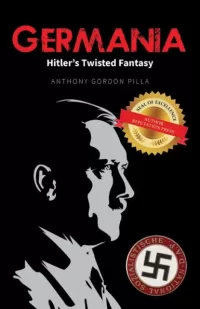Title: Germania: Hitler’s Twisted Fantasy
Author: Anthony Gordon Pilla
Publisher: Author Reputation Press, LLC
ISBN: 978-1638678007
Pages: 120
Genre: Historical Fiction
Reviewed by: Liz Konkel
Hollywood Book Reviews
 This unique story introduces you to the inner workings of Hitler’s fantasy in this “what if” concept that explores Good versus Evil from the perspective of a twisted mind. The visual formatting gives an interesting foray into this world and helps to bring it to life in a way that feels original. The book begins with the 1936 Berlin Olympics which serves as a catalyst for Hitler to imagine his grand victory and kicks off his obsession with expanding Germany’s living space. World War II makes headlines in global newspapers and reports that include Lebensraum, Oktoberfest Blitzkrieg, Lindbergh-Hitler Connection, Jewish Exodus Plan, and the Pacific Summit.
This unique story introduces you to the inner workings of Hitler’s fantasy in this “what if” concept that explores Good versus Evil from the perspective of a twisted mind. The visual formatting gives an interesting foray into this world and helps to bring it to life in a way that feels original. The book begins with the 1936 Berlin Olympics which serves as a catalyst for Hitler to imagine his grand victory and kicks off his obsession with expanding Germany’s living space. World War II makes headlines in global newspapers and reports that include Lebensraum, Oktoberfest Blitzkrieg, Lindbergh-Hitler Connection, Jewish Exodus Plan, and the Pacific Summit.
The formatting is visually stunning and original, lending a unique reading experience you won’t find anywhere else. The twisted fantasy depicted is told entirely through news clippings, synopsis, headlines, and similar sources. The story is pieced together through these various sources to create an immersive experience. The book maintains a chronological order through various dates, maps, and timelines that allow readers to easily keep up with events such as the declaration of German forces invading France and the capture of Paris. The Olympics serves as a catalyst to spark the twisted fantasy in Hitler’s mind and uses this unique style to explore the concept of Evil vs. Good. The aesthetic is interesting as readers are being shown visually the events occurring, and they are able to depict for themselves what Evil vs. Good means in Hitler’s mind. In his mind, you can see his idea of how all his dreams come to life in literal headlines which creates this flashy feeling of him receiving global success. Through these “what-if” visions, readers get the sense that Hitler fancies himself as heroic with actions such as the 3-Powers Act, which is for the “prosperity of all the people.” There is a definite irony in these headlines as he heralds his grand deeds when in reality, he was destroyed rather than saved.
The different clippings are taken from resources such as the Nurnberg Iron Cross, St. Louis Blues, and Manila Hemp. These create a global sensation as these are from all around the world, including the Philippines, America, China, and Japan. The book cleverly uses subtle details like these to create a deeper impact to understand Hitler’s goals on a global scale. Throughout there are significant moments that support the overall theme of Evil vs. Good such as Hitler promising Germans protection outside the Reich, Wendell Willkie defeating FDR, London in grave turmoil over a treaty (which leads to public outcry), and the Exodus Treaty for European Jews. Despite the style, there is plenty of action taking place with the conflict of war and how Hitler viewed himself as part of that conflict.
This style pulls you into the world that has been created as if it is occurring in real-time and takes you back into this time period. It is easy to imagine these headlines being real due to the style which is an effective and clever tool to tell this what-if story. This makes for a fast-paced reading experience with visual creativity that provides something new the more time you spend on each page. The book stands out from other historical reads by daring to do something different. Despite this taking place in his twisted mindscape, you can still see the reality underneath such as Hitler declaring he has no desire for war against France and Britain while secretly issuing directives. This shows the truth buried in the scenario playing out and adds another layer to the book.
Germania: Hitler’s Twisted Fantasy, is indeed a twisted fantasy which comes to life by placing a spin on the historical genre to create a visual alternate concept that will easily appeal to history lovers.

